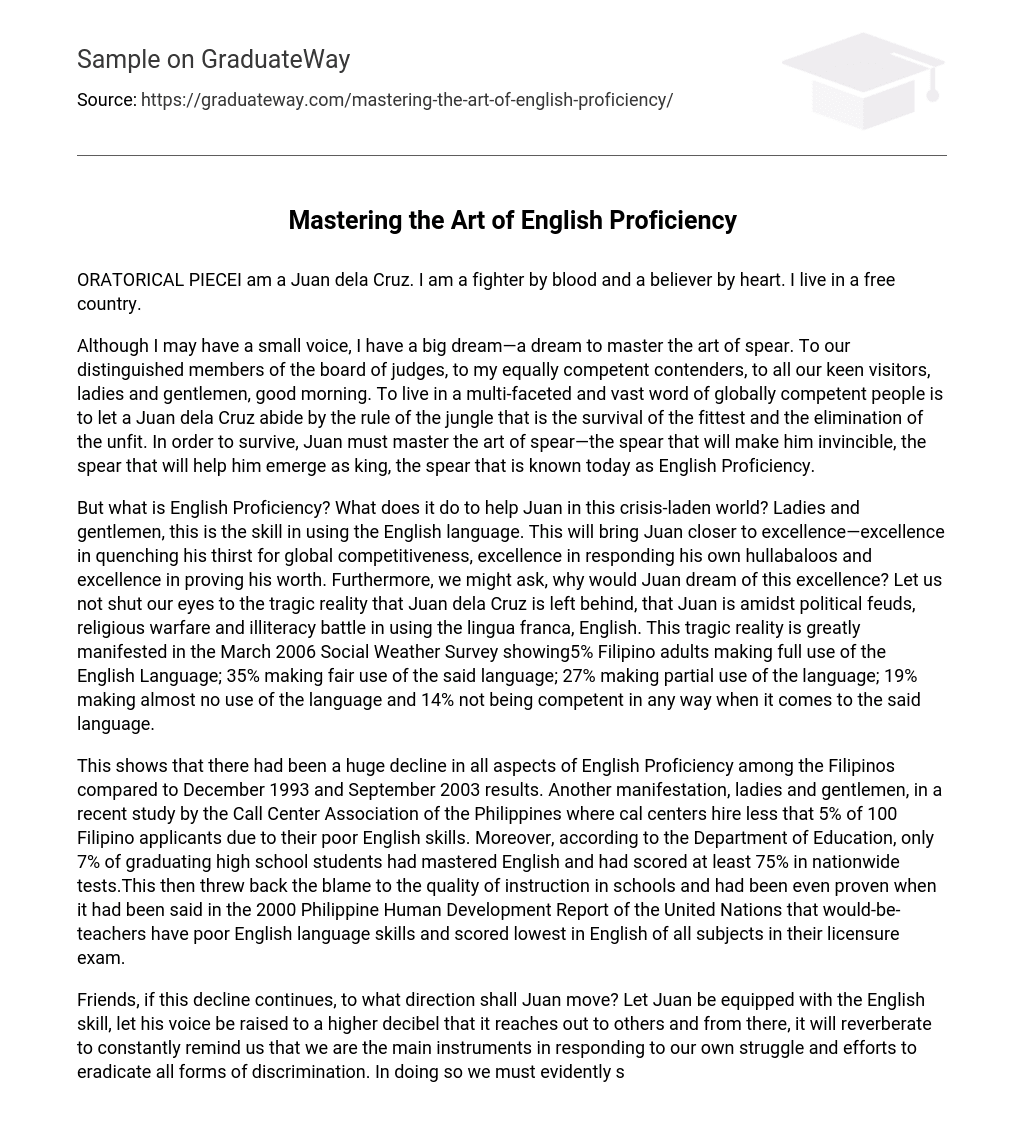ORATORICAL PIECEI am a Juan dela Cruz. I am a fighter by blood and a believer by heart. I live in a free country.
Although I may have a small voice, I have a big dream—a dream to master the art of spear. To our distinguished members of the board of judges, to my equally competent contenders, to all our keen visitors, ladies and gentlemen, good morning. To live in a multi-faceted and vast word of globally competent people is to let a Juan dela Cruz abide by the rule of the jungle that is the survival of the fittest and the elimination of the unfit. In order to survive, Juan must master the art of spear—the spear that will make him invincible, the spear that will help him emerge as king, the spear that is known today as English Proficiency.
But what is English Proficiency? What does it do to help Juan in this crisis-laden world? Ladies and gentlemen, this is the skill in using the English language. This will bring Juan closer to excellence—excellence in quenching his thirst for global competitiveness, excellence in responding his own hullabaloos and excellence in proving his worth. Furthermore, we might ask, why would Juan dream of this excellence? Let us not shut our eyes to the tragic reality that Juan dela Cruz is left behind, that Juan is amidst political feuds, religious warfare and illiteracy battle in using the lingua franca, English. This tragic reality is greatly manifested in the March 2006 Social Weather Survey showing5% Filipino adults making full use of the English Language; 35% making fair use of the said language; 27% making partial use of the language; 19% making almost no use of the language and 14% not being competent in any way when it comes to the said language.
This shows that there had been a huge decline in all aspects of English Proficiency among the Filipinos compared to December 1993 and September 2003 results. Another manifestation, ladies and gentlemen, in a recent study by the Call Center Association of the Philippines where cal centers hire less that 5% of 100 Filipino applicants due to their poor English skills. Moreover, according to the Department of Education, only 7% of graduating high school students had mastered English and had scored at least 75% in nationwide tests.This then threw back the blame to the quality of instruction in schools and had been even proven when it had been said in the 2000 Philippine Human Development Report of the United Nations that would-be-teachers have poor English language skills and scored lowest in English of all subjects in their licensure exam.
Friends, if this decline continues, to what direction shall Juan move? Let Juan be equipped with the English skill, let his voice be raised to a higher decibel that it reaches out to others and from there, it will reverberate to constantly remind us that we are the main instruments in responding to our own struggle and efforts to eradicate all forms of discrimination. In doing so we must evidently speak our mind but in such a way that foreign people may understand us and eventually join us in our battle. From there comes the edge of being erudite in the English language. If only we could beat this English Proficiency crisis, we could penetrate through foreign conversations and we could survive in the global market.
Though English may be another language, it doesn’t mean that we are depriving Juan of his native tongue but letting him see the purpose of speaking so, as Luis Teodoro, a newspaper columnist and journalism professor at the University of the Philippines, said, “Learning another language is a specialized and voluntary process. It can’t be forced on people who don’t see any use of it in their daily lives.”





